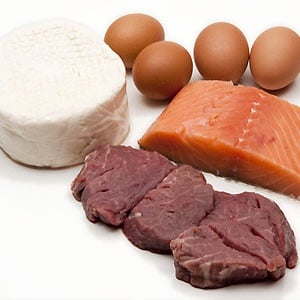
There is much research which supports the debate that regular exercisers, especially those doing resistance training, need more protein than those who don’t exercise. However, it is important to note that there is no one-size-fits-all as the research surrounding this topic is still emerging and nothing is yet conclusive.
Read: Choose the right fitness programme
When to take protein?
The majority of trainers recommend taking some before exercise and some afterwards. The reason being that the protein you take before exercise helps prevent muscle protein breakdown while at the same time encouraging muscle protein synthesis – which basically means preserving the muscle you have which in turn means your muscles will repair faster – as well as supporting the growth of new muscle tissue, which is what helps build muscle and give you that ‘toned’ lean appearance.
Taking protein after exercise is just as important however, as this is when your muscles are most receptive to incoming nutrients and getting some quality protein in after resistance training, which has effectively broken down your muscle tissue, will help feed and preserve the muscle you already have while also creating stronger, new muscle tissue.
According to the Journal of the International Society of Sports Nutrition, “appropriately timed protein intake is an important component of an overall exercise training programme, essential for proper recovery, immune function, and the growth and maintenance of lean body mass”.
They recommend a “strategically planned” protein intake regimen which should be timed around exercise to maximise the benefits of the exercise programme and to not only preserve muscle mass but also to guarantee efficient recovery from the exercise session.
According to the article, there is much research which supports taking some form of easily digestible protein which is rich in essential amino acids and immediately before and following exercise training is the most beneficial for increasing muscle mass, improving recovery after exercise, and has even been shown to sustain immune function during high-volume training.
They conclude that “exercising individuals should consume high quality protein within the time period encompassing their exercise session (i.e. before, during, and after)”.
How much do you need?
This is the million dollar question, and one which continues to cause much debate, especially in the light of certain popular diets such as the Tim Noakes high-protein, low carbohydrate recommendation.
One article in the JISSN, their position with regard to protein and exercise is that “exercising individuals need approximately 1.4 to 2.0 grams of protein per kilogram of bodyweight per day.
The amount is dependent upon the mode and intensity of the exercise, the quality of the protein ingested, and the status of the energy and carbohydrate intake of the individual”.
Yet while they add that ideally protein should be obtained primarily from whole foods, they do concede that some supplemental proteinis “a safe and convenient method of ingesting high quality dietary protein”.
The Institute of Medicine recommends that adults get a minimum of 0.8 grams of protein for every kilogram of body weight per day – that’s about 58 grams (roughly the amount of protein in a 200 g piece of chicken fillet for a 73kg adul.
They claim that “in healthy people, increasing protein intake to 20 to 25% of calories can reduce the risk of heart disease, if the extra protein replaces refined carbohydrates, such as white bread, white rice, or sugary drinks”.
They also maintain that higher protein diets can also “be beneficial for weight loss, in conjunction with a reduced calorie diet”.
Protein quality matters
Yet while many studies support increased intake of protein to meet exercise demands, many experts are quick to point out that the quality of the protein is an important factor.
There are different sources of protein:
- Animal sources of protein such as meat/chicken may deliver all the amino acids we need.
- Some fruits, vegetables, grains, nuts and seeds, also contain some protein but often lack one or more essential amino acids.
It’s also important to remember that some high-protein foods are healthier than others because of what comes along with the protein: healthy fats or harmful ones, beneficial fibre or hidden salt. This is important to consider if weight-loss is your overall goal.
And what about protein supplements? Nutrition and exercise physiology expert, Chris Mohr, PhD, RD, many supplements which contain proper whey protein may be beneficial as he considers whey a “high-quality, complete protein containing all of the essential amino acids that are naturally found in dairy. It is also one of the best sources of branched-chain amino acids (BCAA) including leucine, an amino acid associated with stimulation of muscle protein synthesis”.
In addition to this he believes that a good quality whey protein supplement can assist in weight maintenance, can curb hunger and can significantly contribute towards building more lean muscle when taken in conjunction with a regular resistance training programme.
So there you have it, despite the many different studies available on this topic, the overriding consensus appears to be that people who exercise do indeed need to consume quality protein – before and after exercise. And while first choice should always be to get this protein from a real food source, certain supplements can fill the gap if needed. Just ensure you check with your doctor or dietitian a sports nutrition expert to make sure you get some good advice on which one will be best suited to your needs.
Read more:
High-protein diets: are they safe?
Moderate protein diet works best
The KettleBelle Personal Training
Sources:
- International Society of Sports Nutrition position stand: protein and exercise. Read the full article here.
- Protein quality matters: Read the full article here.
- The Insititute of Medicine, Dietary Reference Intakes. Read the full article here.
- The protein package. Read the article here.




 Publications
Publications
 Partners
Partners









